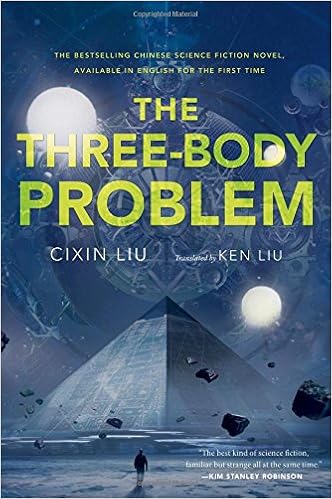
I went looking for this book to buy it to read for my book club, since the library had too many holds to get it to me in time. I got to our big local box-bookstore, and was dismayed to find that they didn't appear to have it. I checked the store computer, which said there were four copies. I eventually found it shelved in the fantasy sections, which...no. Just no. This is not one of those genre-straddling books. It's pretty firmly in the SF camp.
Finally having it in my hot little hands, I settled in to read, but missed finishing it by the time my book club rolled around. That's the first time that's ever happened. Despite my failure to finish it, I plowed through the rest a few days after, having quite enjoyed this book.
It's dark, and pessimistic, although doesn't necessarily end on that note. Perhaps the strongest section is the beginning, which roots what will come firmly in the legacy of the Cultural Revolution in China. We see as academics are forced to dismiss scientific evidence in favour of ideology, on the penalty of death, and one who cannot pretend. His daughter watches as he is killed, and that will stay with her for the rest of her life, motivating all her future actions.
This display of fanaticism inspires a deep pessimism about human nature and the inevitability of a world that will continue to chew up its inhabitants in the name of dogma.
Two things struck me about the book - the theme of ideas overriding evidence, and what that does to people who distort their lives to prove that some scientific principles are wrong because they're counter-revolutionary. The other was how people's experiences influenced what they expected of the aliens.
And aliens there are, from a far-away star (actually, the closest possible one, which is still very far away.) Early Chinese radio broadcasts into space reach them and they respond. In various ways, and partly through a computer game that is there to teach slowly about their civilization. But what do the Trisolarans want? And if they come to Earth, what would the results be?
Some presume that they would usher in an era of fairness, very unlike what they've suffered through. Others that they would scourge the planet, ending humanity's plague on the universe. Nihilists and those willing to give up power to a greater force they know nothing about. Each willing to work unilaterally, without input from the rest of the human race.
There is also the unsettling revelation that science has started not to work, in ways that are driving scientists to deep unease, fear, and in some cases, suicide. Faced with the idea that the rules they'd spent their lives investigating were perhaps local exceptions, the entire world-wide scientific community is in disarray.
This isn't a perfect book, but I thought it did a good job of integrating scientific exposition with genuinely disturbing moments of humanity. The willingness of people to sacrifice everyone else was all too believable, and all too troubling. As a North American reading my first Chinese science fiction, the translation was excellent, and the world both strange and familiar.
I read this book as part of an attempt to read all the Hugo Nominees
Booklinks:
I read this book as part of an attempt to read all the Hugo Nominees
No comments:
Post a Comment